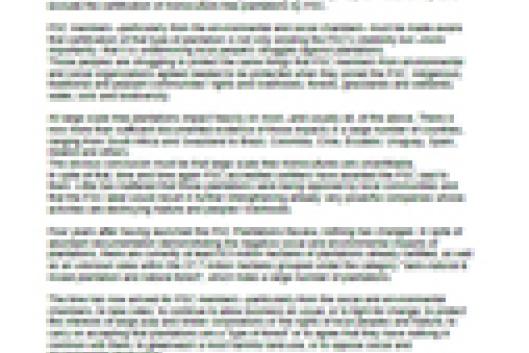PRESS RELEASE -
In a National Consultation held in Delhi on August 7, 2004, several civil society organisations in India including major national alliances on mining, forestry and dams and hydro power, rejected the World Bank’s Country Assistance Strategy (CAS) 2004 on the grounds of:
• Inadequate consultation process and lack of transparency while drafting CAS with the knowledge and participation of Government of India. Apparently, four consultations took place with only two days of notice being given to the invitees. Prominent organisations working on Bank’s past records and accountability were not invited.
• Lack of due and prior information on such a critical policy document which seeks to influence the economic, political, social and environmental policies of the Government.(The Bank claimed it has disseminated the document widely, when in fact the CAS was only available on its website with a commenting period of just three weeks!)
• CAS imposes conditionality of reform and privatisation of key sectors without justification as basis of extending lending to central and state governments
• CAS has no reference whatsoever to the abysmal failures of Bank led initiatives in critical sectors (Eg. Orissa Power Sector reforms, with a loss to the State exceeding Rs. 4,000 crores) and deliberately ignores that the electorate rejected its policies when voting out governments in Andhra Pradesh, Karnataka and Madhya Pradesh
• Consultation on the CAS has been forced on the Government and civil society keeping in view the convenience of the Bank’s Executive that meets in Washington DC on 26 August! This when not one of the Annexures constituting important policy directives of CAS have been released to the public.
The CAS talks of resuming support for large hydro projects in India after a gap of more than 10 years without explaining what prompts it to do so ever since the Bank withdrew from Sardar Sarovar. The organisations wondered how the Bank comes to a conclusion that the National Hydro Power corporation (NHPC) has improved its environmental and social mitigation records when it has in fact went on a rampage in Indira Sagar and Koel Karo projects, and Bank financed Nathpa Jhakri, NHPC’s Parbati are reeling under severe environmental impacts.
Civil society organisations question the credibility of this strategy document, which fails the most minimum standards of academic rigour in analysis, particularly given that the funding linked to this document would have overarching and deep implications, and has been prepared and circulated without any consultation and sanction of both the Indian Parliament and the State Legislatures.
The Consultation also raised concerns on the role of the Indian Government as a collaborator to the CAS document undermining the basic tenets of democracy that the people of this country and its institutions stand for.
Questions were also raised on how and why the Government of India could succumb to the bank’s strategy of promoting large scale privatisation in important sectors such as power, water, agriculture and other basic services going much beyond the mandate of the Tenth Five Year Plan even and the Common Minimum Programme (CMP) adopted by the United Progressive Alliance (UPA) Government in the centre.
The organisations present in the Consultations decided to send a strong communication to the World Bank President to this effect, and prepare a position paper and critique of CAS 2004 which will be sent to the appropriate authorities within the Indian Government, the Bank management and several international networks and organisations as part of a concerted campaign before the CAS is presented to the World Bank Board on August 26.
The Civil Society Organisations also decided to raise the issue of CAS with members of Parliament and State Legislatures to trigger off a national debate on the Country Assistance Strategy questioning the dubious role of World Bank and certain functionaries of the Government prioritizing Bank led developmental goals without any sanction of State Legislatures and the Parliament of India.
The Consultation demanded that the World Bank unilaterally withdraw the draft CAS 2004 and re-engage in extensive consultations with the civil society, the project affected during the next six months with translated copies of the CAS being disseminated within the country and re-iterated that the CAS could only be finalised after being presented in the Indian Parliament.
Manthan Adhyayan Kendra SANDRP
mines minerals & People (mm&P)
National Forum of Forest People and Forest Workers (NFFPFW)
Astha
Jharkhand Jangal Bachao Andolan
Focus on the Global South
Environment Support Group
MATU
Delhi Forum
Citizens Concern on Dams and Development (CCDD)
CORE
Narmada Bachao Andolan
Rural Volunteers Centre (RVC)
Navrachna
Indian Social Institute (ISI)
Habitat International Coalition (HIC)
Lokayan
Contact: F-10/12 Malviya Nagar, New Delhi – 110 017
Tel No. 91 11 26680883, 26680914
Mobile: 91 9818147740
Email: delforum@vsnl.net
